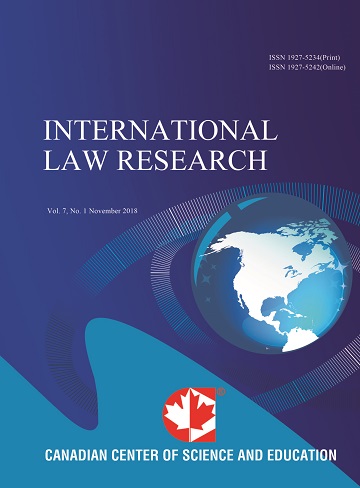Forcible Protection of Nationals Abroad and Humanitarian Intervention: Might or Right?
- Solomon Salako
Abstract
The forcible protection of nationals abroad (a rescue mission) and humanitarian intervention (intervention of one state or a group of states in a territorial state where there is a threat or actual loss of life, forced migration or gross violation of human rights and which, at times, involves government replacement or nation building) are different doctrines which, in functional terms, overlap.
Since 1945, the ius ad bellum (the rules of international law governing the legality of the use of force) are stated in Articles 2(4) and 51 of the UN Charter. Since the end of the Cold War in 1989, some states and an increasing number of scholars have attempted to discard the prohibition of the use of force and to create new exceptions such as preventive war, pro-democratic intervention and unilateral intervention.
The objects of this article are: (i) to assess critically the attempt to drive a horse and a coach through the provisions of Articles 2(4) and 51 of the UN Charter; (ii) to show that a legal regime laid down by the UN Charter which is founded on a genuine ius contra bellum (law against war) remains unaffected; (iii) to show that the transmogrification of ‘political sovereignty’ to ‘popular sovereignty’ and the use of human rights as justifications for humanitarian intervention can be construed as a subterfuge; and (iv) to analyse the economic, political and strategic reasons for humanitarian intervention and to show how stretching international law to justify a ‘right’ is simply replaced by ‘might’.- Full Text:
 PDF
PDF
- DOI:10.5539/ilr.v5n1p152
Journal Metrics
h-index (2017): 2
i10-index (2017): 0
h5-index (2017): N/A
h5-median (2017): N/A
Index
- CNKI Scholar
- COPAC
- CrossRef
- DTU Library
- EuroPub Database
- Excellence in Research for Australia (ERA)
- Ghent University Library
- Google Scholar
- Harvard Library
- Infotrieve
- Jisc Library Hub Discover
- LOCKSS
- Open J-Gate
- PKP Open Archives Harvester
- Publons
- ROAD
- Scilit
- SHERPA/RoMEO
- Stanford Libraries
- Ulrich's
- UniCat
- Universe Digital Library
- UoS Library
- WorldCat
Contact
- Joseph TaiEditorial Assistant
- ilr@ccsenet.org
